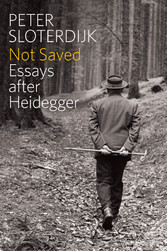
Not Saved - Essays After Heidegger
von: Peter Sloterdijk
Polity, 2016
ISBN: 9780745697024
Sprache: Englisch
300 Seiten, Download: 540 KB
Format: EPUB, auch als Online-Lesen
Preface
Essays after Heidegger—the subtitle of this collection of lectures and essays—simply means that the author, through no fault of his own, finds himself in a time after the thinker, such that he can take up the man and the work historically and compare them with other eminent figures of the twentieth century’s intellectual history, of which the essays reprinted here on Luhmann and the older Critical Theory furnish examples. Somewhat less trivially, the subtitle wishes to indicate that not everything which concerns Heidegger’s work belongs to the past; rather, it is always still possible, advisable, fruitful, and perhaps scandalous to pursue Heidegger’s indications and follow up on some of his suggestions. This circumstance can be most readily observed in the “Human Park” speech and even more so in “The Domestication of Being,” which completes it. Lastly, the formulation Essays after Heidegger means that a theoretical terrain is opened up after Heidegger that one only encounters when—thinking with Heidegger against Heidegger, to cite a turn of phrase of an erstwhile reader of Heidegger, as well known as it is inconsequential—one has freed oneself from the master’s hypnosis, so as to arrive, not least thanks to his strengths, at a position that, according to everything that we know of him, would have displeased him. This stance, both near and distant, is most readily expressed in the introductory piece “The Plunge and the Turn,” which essays an intimate portrait of the thinker and at the same time, as from a great distance, sketches him into a tableau of Old European intellectual culture. We need not comment on the title itself. The god who could still save us is taking his time.
If anything estimable has resulted from the fact that Heidegger is becoming infamous on account of books that have exposed and incriminated him, such as Victor Farías’s Heidegger and Nazism, then perhaps it is because the question concerning the possibilities of drawing on a blameworthy thinker was thereby radicalized. More than is customary, they compel later authors to give an account of the conditions of didactic relations between the philosophical generations of the twentieth century. By their one-sidedness they testify to the fact that in the ongoing “Age of Suspicion” the relations of power between distrust and trust are still out of balance. Whoever wants to draw on Heidegger today must pass through a flaming wall of suspicions without being certain in advance that the discoveries on the other side of the fire are worth the cost.
The present speeches and essays are on the lookout for the place where the bond of common learning can perhaps be rejoined, beyond accusation and apology. This would be nowhere more helpful than in the ‘social philosophy’ of the present moment, which only tentatively emerges from the shadows of extremism. One has still not paid sufficient attention to the extent to which the terror of grand politics has stamped the intellectual physiognomy of the past century. We are still waiting for a suitable presentation of its reflection in the terror-mimetic constructs of grand and critical theory. In a few passages in the present book, I allude to what such a presentation would have to achieve;1 beyond this, I attempt to conceptualize which efforts are needed to free thought from its fixations on standards from the “age of extremes.” Heidegger’s accomplishment—and because of it the indispensability of his voice in the conversation of the present age with the future—in my opinion consists in the fact that, under the title of the question of Being, he worked for his entire life on a logic of commitment that, even before the division of ontology and ethics, remained on the trail of the antagonism between liberating and compulsory tendencies in the Dasein of those who die and those who are born. Heidegger’s investigations thus belong to the ascendance of a problem that is the most serious thing to be thought today, that is, they belong to the development of a theory of participatory relations that is combined with a critique of emergency reasoning [Ernstfall-Vernunft].2
The essays in this volume are collected renunciations of exhaustive detail. They present findings from the 1990s, with the exception of the text “What Is Solidarity with Metaphysics at the Moment of Its Fall?” whose oldest parts can be traced back to a lecture held in Rotterdam in 1989 on the occasion of the twentieth anniversary of Adorno’s death. They originated between 1993 (“Alētheia or the Fuse of Truth”) and 2000 (“The Domestication of Being”), and were as a rule contributions to conferences and symposia. Hence all of them are elliptical, if one defines the ellipsis as the art form of precipitousness. Only the third text, for substantive reasons, comes a little closer to the conventional ideal of exhaustive detail. More recent additions have been included in footnotes and as additions to the texts. In addition to the speech “Rules for the Human Park,” which achieved a distorted renown by being taken out of context, a few other texts from this collection have been published here and there, among other places in a French anthology that contained older versions of the speeches “The Plunge and the Turn,” “Wounded by Machines,” “The Time of the Crime of the Monstrous,” and the Cioran essay.3 I would like to mention that the two introductory pieces, the one on Heidegger’s “Thinking in Motion” (1996) and the other on Luhmann (“Devil’s Advocate,” 1999), had their baptismal debut at the Freiburg City Theater. They trace back to invitations from the Institut für soziale Gegenwartsfragen [The Institute for Contemporary Social Questions], which during the second half of the 1990s conducted a series of matinees in collaboration with the Städtische Bühnen Freiburg [Urban Stages of Freiburg] and what was then Südwestfunk [Southwest Radio] under the title “Denker auf der Bühne” [Thinkers on the Stage]. For these impetuses and for including me in such stimulating contexts I am grateful to the organizers in Freiburg, especially Christian Matthiessen. As a token of this I have retained certain rhetorical figures in both texts, including the address “ladies and gentlemen.”
Only in reading the texts can one learn about their internal coherence. I would like to note that I find satisfaction in being able to present together what belongs together. The speech “Rules for the Human Park,” which for extrinsic reasons I have reprinted nearly unchanged (with minor improvements of a stylistic nature), benefits from this in particular. It now appears, as planned, alongside its neighboring essays “Alētheia or the Fuse of Truth” and above all “Wounded by Machines.” The note “The Time of the Crime of the Monstrous” also belongs in their vicinity. The micro-historical critique of humanism in the human park speech is now to be considered together with the macro-historical definition of humanity in the “Wounded” essay. The remarks on ‘anthropotechnics’ are recontextualized with references to Western culture’s calendar of truth and the continuum of the phantasms of a technological imitation of nature. The anthropological and techno-philosophical implications of the human park speech are developed more broadly in the central essay of this volume, “The Domestication of Being: The Clarification of the Clearing,” which was initially written for an international colloquium on questions of biotechnology that took place at the Centre Georges Pompidou in Paris in March 2000.4 The concluding section of this essay, “The Operable Human Being,” was delivered as a lecture and discussed separately in various forums, such as at Harvard University’s Center for European Studies in Cambridge, at a conference on questions of the biotechnological formation of the human being at UCLA and the Goethe Institute in Los Angeles in May 2000, at the Philosophical Seminar of the Universidad Autonoma in Madrid in October 2000, and at a forum organized by the newspaper Le Monde concerning technophobic and technophilic tendencies of modern society in Le Mans in November of the same year, as well as a meeting of the working group Wissenschaft und Verantwortung [Science and Responsibility], held by the Carl Friedrich von Weizsäcker-Gesellschaft in Munich. On the whole, “The Domestication of Being” sums up a series of lectures and seminars from past years that were devoted to historical anthropology, paleo-psychology, media theory, and the philosophy of cybernetics.
In the third section of the lecture “On Critical and Exaggerated Theory” there is a reference to the hyperbolic dynamic of philosophical texts, which can perhaps be read pro domo. If, following the rhetorical tradition, one understands hyperbole as a “proper exaggeration of the truth,”5 what then is philosophy other than the search for the proportion between that which is exaggerated and that which is not exaggerated that would be convincing for the present day?
Notes
1. See the first section of chapter 3. 2. For the critique of emergency reasoning, cf. Bazon Brock, Die Re-Dekade: Kunst und Kultur der 8oer Jahre (Munich:...










